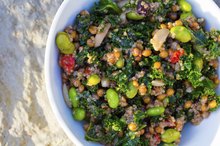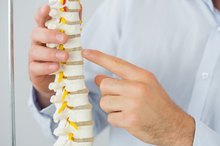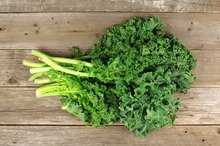Vitamins for Mononucleosis
Mononucleosis is a viral infection caused by the Epstein Barr virus. It is spread through saliva and symptoms may include sore throat, fever, fatigue, weight loss and loss of appetite. It typically lasts for two or three weeks, but it can persist past this time. Treatment generally consists of pain medications, antiviral drugs and a healthy diet. A variety of vitamins can relieve mononucleosis symptoms and restore your health. It is important to contact a medical professional before taking vitamins for mononucleosis.
Vitamin B-12
Foods rich in vitamin B-12 include:
- rainbow trout
- milk
- plain yogurt
- beef liver
- top sirloin beef
- white tuna
- salmon
- breakfast cereals
- eggs
- roasted chicken
Vitamin C
Vitamins for an Overactive Bladder
Learn More
The recommended daily dosage for vitamin C is 1,000 milligrams for teens and adults. Foods rich in vitamin C include:
- blackberries
- grapefruits
- lemons
- limes
- oranges
- pineapples
- grapefruits
- tomatoes
- broccoli
- spinach
- Swiss chard
Vitamin D
Foods rich in vitamin D include:
- fortified orange juice
- beef liver
- ready-to-eat cereals
- milk
- tuna fish
- salmon
- fortified yogurt
- sardines
- eggs
- Swiss cheese
Vitamin E
Vitamins and Minerals for Fever Blisters
Learn More
The recommended daily dosage for vitamin E is 11 milligrams for teens and 15 milligrams for adults. Foods rich in vitamin E include:
- wheat germ oil
- peanut butter
- corn oil
- hazelnuts
- sunflower oil
- broccoli
- tomatoes
- spinach
- mangoes
- kiwi
Related Articles
References
- Common Symptom Guide: A Guide to the Evaluation of Common Adult and Pediatric Symptoms; Harold C. Sox, Jr., John H. Wasson and Timothy B. Walsh
- Nature's Pharmacy for Children: Drug-Free Alternatives for More Than 200 Childhood Ailments; Lendon H. Smith, Lynne Paige Walker and Ellen Hodgson Brown
- Vitamins and Minerals Demystified; Steve Blake
- Everything You Need to Know About Mononucleosis; Paul Smart
- The Complete Idiot’s Guide to Vitamins and Minerals Sheila Buff
Writer Bio
R. Y. Langham served as a senior writer for "The Herald" magazine from 1996-99. Langham holds a Bachelor of Arts in English from Fisk University, a Master of Science in marriage and family therapy from Trevecca Nazarene University and a Ph.D in family psychology from Capella University. Dr. R.Y. Langham published her first psychological thriller in September 2011. It can be purchased on Amazon.com, Barnes&Noble.com and Lulu.com.









